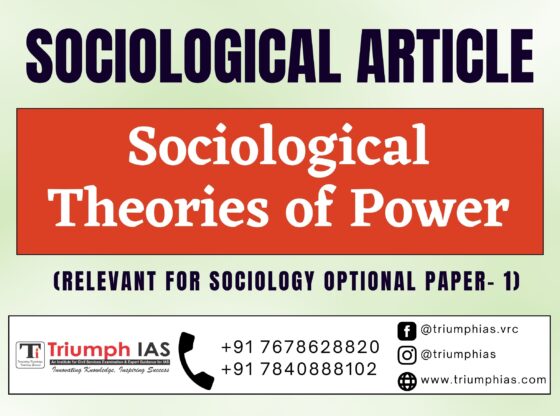Sociological Theories of Power
Relevant for sociology optional Paper- 1 (Unit- 7 : Sociology- Politics & Society)
Sociological theories of power are an essential component of understanding how society functions. Power is a complex concept that is deeply intertwined with social structures and relations, and sociological theories offer various perspectives on the sources, distribution, and exercise of power in society. In this essay, I will discuss some of the major sociological theories of power, their key concepts and assumptions, and their contributions to our understanding of power dynamics.
One of the foundational theories of power is the Marxist theory, which views power as an inherent aspect of social relations in capitalist societies. According to Marx, power is concentrated in the hands of the ruling class, who control the means of production and use their economic power to dominate and exploit the working class. Marx argued that the state, which appears to be neutral, actually serves the interests of the ruling class by maintaining the existing power relations and suppressing dissent. In this sense, power is not just a matter of individual actions, but rather a structural feature of capitalist society. The Marxist theory has been influential in shaping critiques of capitalism and neoliberalism, as well as the broader field of critical theory.
Another important perspective on power is the Weberian theory, which emphasizes the role of bureaucracy and rationalization in the exercise of power. According to Weber, power is not just about coercion or domination, but also about the ability to get things done efficiently and effectively. In this sense, power is closely tied to the development of modern bureaucracies, which use rules and procedures to regulate social life. Weber also distinguished between different forms of authority, including traditional, charismatic, and legal-rational authority. Traditional authority is based on custom and tradition, while charismatic authority is based on the personal qualities of a leader. Legal-rational authority, on the other hand, is based on a system of rules and regulations that are applied impersonally to all members of society. Weber’s theory has been influential in shaping our understanding of the role of bureaucracy in modern society, as well as the development of the welfare state.
A third perspective on power is the feminist theory, which focuses on the gendered nature of power relations. Feminist theorists argue that power is not just a matter of class or status, but also of gender, race, and other social identities. Patriarchy, which is the system of male domination over women, is seen as a key source of power in society. Feminist theorists also emphasize the intersectionality of power, meaning that different social identities intersect to produce complex power dynamics. For example, women of colour may experience a different kind of power oppression than white women, due to their race as well as their gender. Feminist theory has been influential in shaping our understanding of gender and sexuality, as well as the intersectionality of power relations.
A fourth perspective on power is the Foucauldian theory, which emphasizes the role of power in shaping discourse and knowledge. According to Foucault, power is not just a matter of domination or coercion, but also of knowledge and discourse. Power is not just something that the ruling class possesses, but something that permeates all aspects of society, shaping our perceptions, beliefs, and behaviours. Foucault also emphasized the idea of “disciplinary power,” which refers to the ways in which institutions like schools, prisons, and hospitals use surveillance and control to regulate behaviour. Foucault’s theory has been influential in shaping our understanding of the role of power in shaping discourse, knowledge, and subjectivity.
A fifth perspective on power is the postcolonial theory, which focuses on the legacy of colonialism and imperialism in shaping power relations. Postcolonial theorists argue that power is not just a matter of economic or political dominance, but also of cultural and epistemological domination. Colonialism involved not just the imposition of political and economic structures, but also the imposition of Western knowledge and cultural norms on colonized peoples, which perpetuated power imbalances and reinforced colonial domination. Postcolonial theory has been influential in shaping our understanding of the ongoing legacies of colonialism and the ways in which power relations are shaped by cultural and historical factors.
Overall, sociological theories of power offer diverse and nuanced perspectives on the sources, distribution, and exercise of power in society. These theories emphasize the structural, cultural, and intersectional dimensions of power, and offer insights into the ways in which power operates at various levels of social organization. By understanding these theories, we can gain a more critical and nuanced understanding of power dynamics in our own societies, and work towards more equitable and just social relations.
In conclusion, sociological theories of power are crucial for understanding how power operates in society. These theories offer diverse and complementary perspectives on the sources, distribution, and exercise of power, and emphasize the structural, cultural, and intersectional dimensions of power relations. By engaging with these theories, we can develop a more critical and nuanced understanding of power dynamics in our own societies, and work towards more equitable and just social relations. It is important to continue to develop and refine these theories, and to apply them in practical ways to address issues of power and inequality in our societies.
For more such notes, Articles, News & Views Join our Telegram Channel. https://t.me/triumphias
Click the link below to see the details about the UPSC – Civils courses offered by Triumph IAS. https://triumphias.com/pages-all-courses.php


